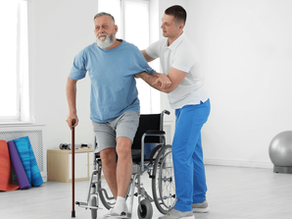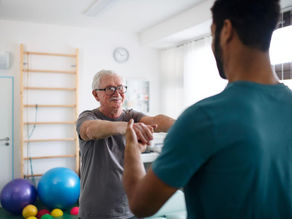top of page
B L O G
Exercise Matters is dedicated to improving your health and well-being through personalized Exercipe Physiology services. Our team of experienced Exercise Physiologists are committed to helping you recover from injuries, manage chronic conditions, and enhance your overall quality of life. Our mantra is to prescribe movement as a medicine. If all the bennefits of exercise could be put into a pill form then it would be prescribed more than any other medication. Our blogs are deigned to try and inform these bennefits of Exercise as a Medicine.



Strength and Conditioning for Peak Athletic Performance
Achieving peak athletic performance requires more than just natural talent. It demands a well-structured approach to training that...

Jasmine Green
Oct 10, 20254 min read


Transform Your Health With Expert Exercise Physiology
Transforming your health can seem like a daunting task, but with the right guidance and expertise, it can be an empowering and enjoyable journey. Exercise Physiology programs offer a pathway to wellness through structured, tailored exercises designed to meet your specific needs. Whether you’re recovering from an injury, managing a chronic condition, or simply looking to enhance your overall physical well-being, these programs can make a significant difference. Let’s explore h

Jasmine Green
Jul 23, 20255 min read


When Shin Pain Slows You Down, Here’s How to Get Back on Track
You lace up your shoes for a run, but after just 10 minutes, your shins start burning. It feels like someone is drilling into your lower legs. You try to push through, but it only gets worse. At Exercise Matters, we help runners recover from shin splints by identifying the cause, correcting technique, and prescribing evidence-based exercises. Here's how to beat shin splints and return to running pain-free. What Are Shin Splints? "Shin splints" is a common term for medial tibi

Sven Rees
Jul 8, 20254 min read


Don’t Let Foot Pain Stop You in Your Tracks: Overcoming Plantar Fasciitis
You step out of bed—and a sharp, stabbing pain hits your heel. Walking feels like you’re stepping on glass. Sound familiar? That’s the hallmark of plantar fasciitis. At Exercise Matters, we help active individuals overcome plantar fasciitis with a structured rehabilitation plan based on the latest research. This blog covers what plantar fasciitis is, what causes it, and which exercises provide real relief. What Is Plantar Fasciitis? Plantar fasciitis is inflammation of the pl

Sven Rees
Jul 8, 20253 min read


Noosa Neuro Rehab: Personalised Neurological Recovery on the Sunshine Coast
Movement, Confidence, and Recovery - Closer to Home Living with a neurological condition like stroke, MS, or brain injury can make...

Sven Rees
Jul 5, 20253 min read


Regaining Control: How Neurological Rehabilitation Helps You Reclaim Your Life
Why Neurological Rehab Matters At Exercise Matters in Noosaville, we understand that neurological conditions can affect every aspect of...

Sven Rees
Jul 5, 20254 min read


Acquired Brain Injury: Symptoms and Treatment Options for Regaining Control
Understanding and Overcoming the Challenges of ABI Acquired Brain Injury (ABI) can be unpredictable and overwhelming. You or your loved...

Sven Rees
Jun 9, 20253 min read


Exercise Physiology for Acquired Brain Injury: Regaining Strength, Function, and Confidence
Moving Forward After a Life-Changing Event An acquired brain injury (ABI) can turn life upside down. Whether from trauma, stroke,...

Sven Rees
Jun 9, 20252 min read


Acquired Brain Injury and the NDIS: Accessing Rehabilitation and Support
Your NDIS Guide to Recovery After ABI Navigating life after an Acquired Brain Injury (ABI) is hard enough—navigating the NDIS shouldn’t be. Many families and individuals feel overwhelmed by paperwork, plans, and the pressure to advocate for the right supports. At Exercise Matters, we help people with ABI access the rehabilitation and support they need through the National Disability Insurance Scheme (NDIS). Our Exercise Physiologists are experienced in writing reports, dev

Sven Rees
Jun 9, 20253 min read


Exercise Physiology for Cerebral Palsy: Building Strength, Independence, and Confidence
Creating New Possibilities at Every Age Living with Cerebral Palsy (CP) comes with challenges—tight muscles, poor coordination,...

Sven Rees
Jun 9, 20252 min read


Games-Based Exercise for Cerebral Palsy: Why Fun Is Serious Rehab
Movement That Feels Like Play—But Delivers Real Results Rehabilitation for Cerebral Palsy (CP) doesn’t have to feel clinical or...

Sven Rees
Jun 9, 20253 min read


Cerebral Palsy and the NDIS: Getting the Right Support for Movement and Independence
Navigating the NDIS with Confidence Accessing therapy and support for Cerebral Palsy can feel overwhelming—paperwork, plans, and...

Sven Rees
Jun 9, 20252 min read


What Are Functional Neurological Symptoms? Understanding FND and How to Manage It
Symptoms That Are Real—And Reversible You’re experiencing strange, disruptive symptoms—sudden weakness, tremors, seizures—but all the tests come back normal. It feels scary, confusing, and like no one believes you. These are known as Functional Neurological Symptoms. They are very real, and with the right support, they are treatable. At Exercise Matters , we help clients understand and manage these symptoms using evidence-based neurological treatment and functional rehabili

Sven Rees
Jun 8, 20252 min read


Functional Neurological Disorder (FND) Treatment: A Multidisciplinary Approach to Recovery
There Is a Way Forward A diagnosis of Functional Neurological Disorder (FND) can leave people feeling dismissed, misunderstood, and unsupported. You may have real symptoms—but no structural brain damage. You might hear, "It’s all in your head." But we know better. At Exercise Matters , we understand that FND is real, and it is treatable. With a team-based, evidence-based neurological treatment plan —including movement retraining, psychology, education, and support—recovery i

Sven Rees
Jun 8, 20253 min read


Functional Neurological Disorder (FND) and Exercise: Regaining Control Through Movement
Rewiring the Brain Through Purposeful Movement If you’ve been diagnosed with Functional Neurological Disorder (FND), you may feel confused, frustrated, or even dismissed. Symptoms are real—limb weakness, tremors, gait problems, or seizures—but they often don’t follow the patterns of traditional neurological disease. At Exercise Matters , we specialise in helping clients with FND rebuild movement confidence, retrain motor patterns, and regain function through evidence-based

Sven Rees
Jun 8, 20253 min read


Multiple Sclerosis and Exercise: What You Need to Know to Stay Strong, Mobile, and Independent
Movement Is Medicine for MS Living with Multiple Sclerosis (MS) can feel frustrating and uncertain. You may feel like rest is safer than movement, especially on days when fatigue or numbness flare up. But avoiding movement can make symptoms worse over time. Exercise is one of the most powerful tools to manage MS symptoms and maintain independence. At Exercise Matters , we help people with MS use movement as medicine—safely and effectively. Why Is Exercise So Important for M
Sheryl Sarmiento Wheeler
Jun 8, 20253 min read


Exercise Physiology for Multiple Sclerosis: Slowing Progression and Reclaiming Function
Moving Through MS With Confidence Living with MS can feel unpredictable. One day you're steady on your feet, and the next you're battling fatigue, numbness, or spasticity. It’s easy to feel like control is slipping away. At Exercise Matters, we use evidence-based Exercise Physiology to help people with Multiple Sclerosis (MS) improve strength, energy, balance, and daily function. With the right movement strategies, you can reduce flare-ups, build resilience, and live bette

Sven Rees
Jun 8, 20253 min read


Multiple Sclerosis Treatment Options: Why Exercise Should Be Part of Every MS Plan
Navigating MS with a Holistic Approach If you or someone you love has been diagnosed with Multiple Sclerosis (MS), the treatment options...

Sven Rees
Jun 8, 20253 min read


Rewiring the Brain After Stroke: How Exercise Creates New Neural Pathways
The Power of Neuroplasticity in Stroke Recovery After a stroke, you may feel like parts of your body are no longer listening to your...

Sven Rees
Jun 8, 20253 min read


Stroke Rehab: How Long Does Stroke Recovery Take?
Understanding Recovery Timelines—and the Power of Persistence After a stroke, one of the first questions people ask is: How long will it...

Sven Rees
Jun 8, 20253 min read
bottom of page



